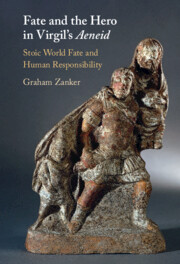
-
Select format
-
- Publisher:
- Cambridge University Press
- Publication date:
- April 2023
- April 2023
- ISBN:
- 9781009319850
- 9781009319874
- Dimensions:
- (229 x 152 mm)
- Weight & Pages:
- 0.55kg, 278 Pages
- Dimensions:
- Weight & Pages:
- Subjects:
- Classical Studies, Classical Literature
You may already have access via personal or institutional login- Subjects:
- Classical Studies, Classical Literature
Book description
This book explores how Virgil in his Aeneid incorporates the ancient Stoics' thinking about how humans can exercise moral responsibility and how this can affect providential world fate. The third-century BC philosopher Chrysippus of Soli located this freedom in the way we can assent to courses of action, and Graham Zanker innovatively demonstrates how Virgil appropriates this concept in the way that Jupiter and Aeneas can assent to the world fate in which they have discovered they must play a part, or Juno and Dido can withhold their assent to it. Indeed, Virgil even offers the model to no-one less than Augustus: the emperor is invited to give his assent to ruling what was believed to be his 'world-wide' empire justly. The book is accessible to both students and professional scholars of the Aeneid, with all Greek and Latin translated into idiomatic English.
Reviews
‘[This] is a work of great interest. By reflecting on it, studying the Stoic doctrine of fate, and probably disagreeing with Zanker, scholars of Virgil will better understand the nature of fate in the Aeneid, one of the poem’s fundamental concepts.’
Sergio Casali Source: Bryn Mawr Classical Review
Contents
Metrics
Altmetric attention score
Full text views
Full text views help Loading metrics...
Loading metrics...
* Views captured on Cambridge Core between #date#. This data will be updated every 24 hours.
Usage data cannot currently be displayed.
Accessibility standard: Unknown
Why this information is here
This section outlines the accessibility features of this content - including support for screen readers, full keyboard navigation and high-contrast display options. This may not be relevant for you.
Accessibility Information
Accessibility compliance for the PDF of this book is currently unknown and may be updated in the future.


